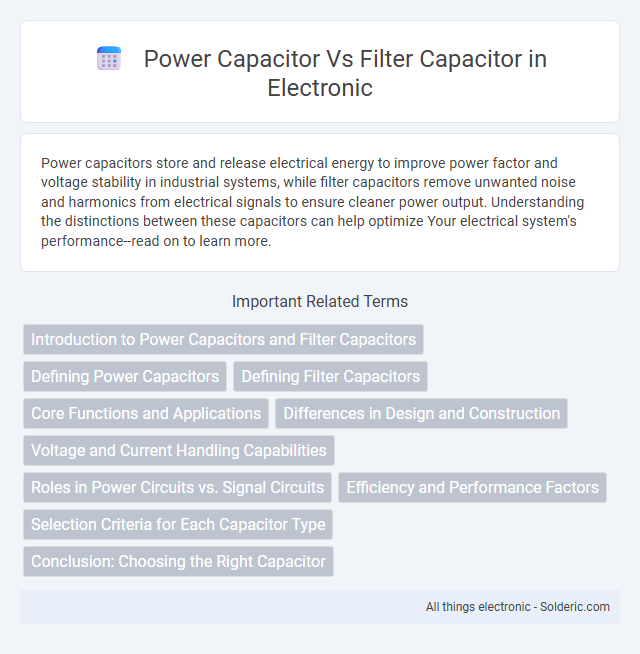Power capacitors store and release electrical energy to improve power factor and voltage stability in industrial systems, while filter capacitors remove unwanted noise and harmonics from electrical signals to ensure cleaner power output. Understanding the distinctions between these capacitors can help optimize Your electrical system's performance--read on to learn more.
Comparison Table
| Feature | Power Capacitor | Filter Capacitor |
|---|---|---|
| Primary Use | Power factor correction in electrical systems | Signal filtering in electronic circuits |
| Voltage Rating | High voltage (up to several kV) | Low to medium voltage (usually under 100 V) |
| Capacitance Range | Microfarads to hundreds of microfarads | Picofarads to microfarads |
| Frequency Range | 50 Hz to 60 Hz (power line frequencies) | Up to several MHz (signal frequencies) |
| Construction | Robust, designed for high current and voltage | Compact, designed for frequency response and low ESR |
| Common Applications | Industrial power systems, motors, transformers | Audio circuits, RF circuits, power supplies |
| Key Benefit | Improves power factor and reduces energy loss | Reduces noise and ripple in signals |
Introduction to Power Capacitors and Filter Capacitors
Power capacitors store and release electrical energy to improve power factor and voltage stability in electrical systems, primarily used in power factor correction and energy storage applications. Filter capacitors, designed to smooth out voltage fluctuations by filtering out AC ripples, are essential in signal processing and power supply circuits to ensure clean and stable DC output. Both capacitors play critical roles in electrical engineering but serve distinct functions based on their design and application requirements.
Defining Power Capacitors
Power capacitors are essential components designed to improve power factor and voltage stability in electrical systems by storing and releasing electrical energy efficiently. Unlike filter capacitors, which primarily remove unwanted frequencies and noise from circuits, power capacitors are engineered to handle high reactive power demands and maintain energy flow in AC power networks. Your choice between power capacitors and filter capacitors depends on whether you aim to optimize power quality or eliminate signal interference.
Defining Filter Capacitors
Filter capacitors are electronic components designed to smooth and stabilize voltage by filtering out unwanted noise and ripple in power supplies. Unlike power capacitors, which primarily store and release energy in power systems, filter capacitors reduce fluctuations and improve the quality of electrical signals. Your electronic devices rely on filter capacitors to maintain consistent performance by ensuring clean and stable voltage delivery.
Core Functions and Applications
Power capacitors primarily function to improve power factor in electrical systems, reducing reactive power and enhancing energy efficiency, while filter capacitors are designed to remove unwanted frequencies or noise from power signals, ensuring clean and stable voltage output. Your choice between these capacitors depends on the specific application: power capacitors are essential in industrial plants and large electrical networks for voltage regulation and energy savings, whereas filter capacitors are crucial in electronic devices and communication systems to maintain signal integrity and prevent electromagnetic interference. Understanding the core functions--power factor correction for power capacitors and noise filtration for filter capacitors--helps optimize system performance and longevity.
Differences in Design and Construction
Power capacitors are designed with robust construction to handle high voltage and current loads in electrical power systems, featuring durable dielectric materials and solid metal casings for heat dissipation. Filter capacitors have compact designs optimized for smoothing ripple voltages in electronic circuits, using thin foil electrodes and electrolytic or film dielectrics for precise frequency filtering. Your choice depends on the application's voltage tolerance and frequency response requirements, as power capacitors prioritize reliability under stress while filter capacitors emphasize signal clarity.
Voltage and Current Handling Capabilities
Power capacitors are designed to handle high voltage and current levels in industrial applications, often rated for thousands of volts and several kiloamperes to ensure stability in power factor correction and load balancing. Filter capacitors operate at lower voltage ratings, typically within a few hundred volts, and manage relatively smaller current flows, optimized for smoothing and noise reduction in electronic circuits. The superior voltage and current handling capabilities of power capacitors make them essential for large-scale power systems, whereas filter capacitors suit precision control in signal filtering.
Roles in Power Circuits vs. Signal Circuits
Power capacitors in power circuits primarily serve to improve power factor and stabilize voltage by storing and releasing energy in alternating current systems. Filter capacitors in signal circuits function to remove unwanted noise and smooth voltage fluctuations, ensuring signal integrity and clarity. The distinct roles highlight power capacitors' emphasis on energy efficiency and stabilization, while filter capacitors focus on signal conditioning and noise reduction.
Efficiency and Performance Factors
Power capacitors enhance electrical system efficiency by providing reactive power compensation, which reduces energy losses and stabilizes voltage levels. Filter capacitors improve performance by eliminating harmonic distortions and noise in electrical signals, ensuring cleaner power supply and protecting sensitive equipment. Choosing the right capacitor type can optimize Your system's energy consumption and operational reliability.
Selection Criteria for Each Capacitor Type
Selection criteria for power capacitors focus on high voltage ratings, energy storage capacity, and durability under continuous load to support power factor correction and voltage stabilization in industrial applications. Filter capacitors require low equivalent series resistance (ESR), high frequency response, and rapid charge-discharge capability to effectively remove ripple voltage and smooth out signals in power supplies and electronic circuits. Choosing the correct capacitor type depends on the application's electrical characteristics, desired lifespan, and operating environment conditions.
Conclusion: Choosing the Right Capacitor
Power capacitors are primarily designed for energy storage and power factor correction in electrical systems, while filter capacitors focus on smoothing voltage fluctuations and reducing electrical noise. Your selection depends on whether you need to enhance energy efficiency and stabilize power flow or improve signal quality by filtering unwanted frequency components. Choosing the right capacitor ensures optimal system performance and longevity tailored to your specific application needs.
power capacitor vs filter capacitor Infographic

 solderic.com
solderic.com